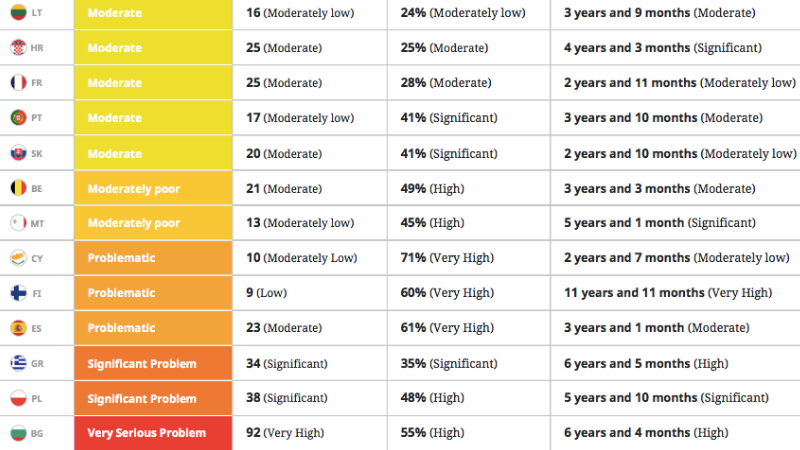Close to half the judgments by European Courts in relation to Malta have not been implemented, according to a report by Democracy Reporting International and the European Implementation Network.
The report, ‘Justice Delayed and Justice Denied: Non-Implementation of European Courts Judgments and the Rule of Law’, highlights Malta’s “lack of consistency” in implementing judgments made by the Courts.
The report considers judgements made by the European Courts of Human Rights (ECtHR) and the European Courts of Justice (CJEU). The report notes that unlike the ECtHR, the implementation of CJEU judgments is not tracked at a level that would allow for quantitative analysis. However, some overarching trends and recent developments were traced.
In the past 10 years, 55% of Malta’s cases have been implemented while 45% are still pending implementation – a percentage at the higher end of the spectrum when it comes to non-implementation, leading to its classification as “moderately poor”.
The methodology used by the organisations for this report ranks member states based on three criteria: the number of leading judgments pending implementation, the proportion of leading judgments pending implementation from the last 10 years and the average time leading cases have remained unimplemented.
The report noted that Malta is not the subject of a high number of judgments from the Strasbourg Court and there are a moderately low number of leading judgments pending implementation.
“However, when violations are found by the ECtHR, the judgments of the Court are not being implemented consistently,” the report says.
“This is demonstrated by the fact that the proportion of leading cases which are still pending implementation is quite high. Furthermore, the average amount of time for which these judgments have been pending is significant, indicating that several cases have been pending for a long time,” it continues.

A table ranking EU member states.
On average, leading judgments in Malta’s case have been pending for five years and 1 month – deemed as a “significant amount of time”.
As of January 2022, there were 13 leading judgments pending implementation in regard to Malta, deemed by the analysis to be “a moderately low number of pending leading judgments”.
Four of the pending leading judgments in Malta concern either rent control legislation, or disproportionate control of property in the context of landlord-tenant relationships, it noted.
“These groups of judgments alone are composed of over 30 repetitive judgments; the Maltese authorities have the obligation to take individual and general measures to implement them,” the report says.
One of the oldest cases mentioned in the report is the Ghigo group of judgments, which has been pending implementation since 2006 and concerns the disproportionate control of the applicants’ property.
The Maltese authorities have implemented four ECtHR judgments in the past two years, which covered issues such as the excessive extension of pre-trial detention on remand (Mikalauskas v. Malta), and access to effective justice (Carmen Saliba v. Malta).
Overall, the research found the lack of implementation of judgments to be widespread in member states, telling of a larger issue.
“The non-implementation of judgments of the European Courts has become a systemic problem. Around 40% of the leading judgments of the ECtHR relating to EU states from the last 10 years have not been implemented. Each of these judgments represents a significant or structural problem, often with direct consequences for many citizens. And yet, authorities have not implemented them,” the organisations said in their report.
Out of the 27 EU member states, Malta ranked 18th when it comes to the implementation of leading judgments. Romania, Italy and Hungary held the worst scores and were deemed to have a “very serious problem”. Meanwhile, Luxembourg, the Czech Republic, Denmark and Estonia were found to be the least problematic.













